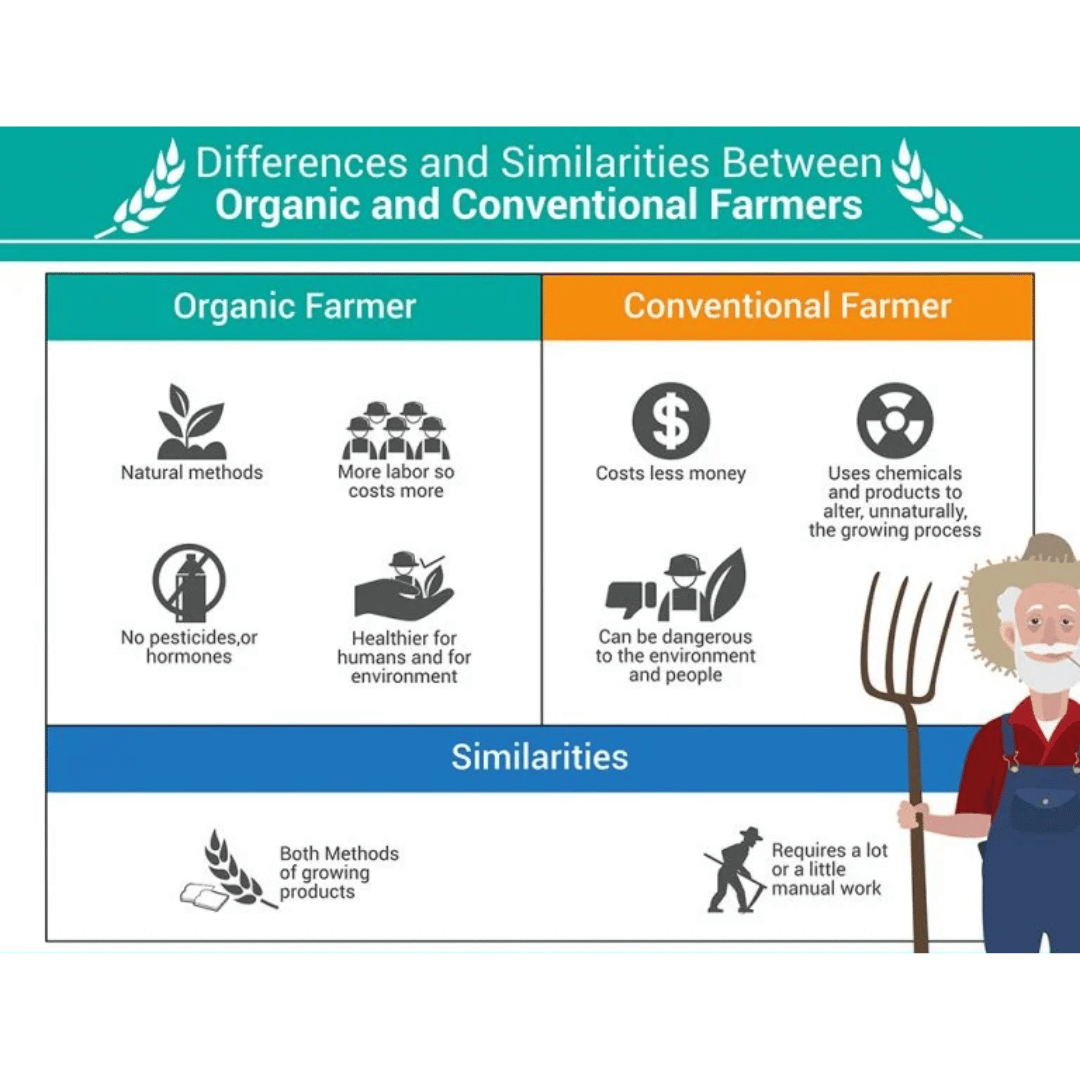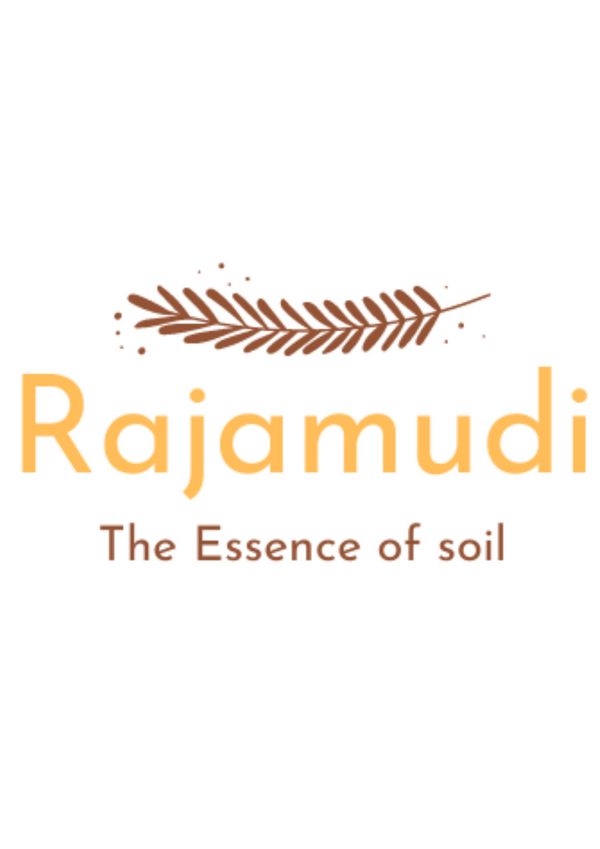
Organic vs. Conventional Products: What’s the Difference?
In recent years, organic products have gained significant popularity as more people become aware of the impact of their food choices on their health and the environment. Despite this growing demand, there are still misconceptions and questions surrounding organic vs. conventional products. Are organic foods truly better for you? How do they compare in terms of taste, quality, and nutrition? Is the price difference justified?
In this blog, we’ll explore the key differences between organic and conventional products, focusing on taste, quality, and health, while also addressing some of the most common misconceptions about the cost and availability of organic food.
What are Organic Products?

Organic products are grown and processed without the use of synthetic pesticides, chemical fertilizers, genetically modified organisms (GMOs), or artificial preservatives. Organic farming practices emphasize sustainability, soil health, and biodiversity, promoting a natural ecosystem that benefits both the environment and human health.
To be certified organic, products must adhere to strict guidelines set by regulatory bodies, such as the USDA (United States Department of Agriculture) or India’s National Programme for Organic Production (NPOP). Organic certification ensures that products are free from harmful chemicals and meet high standards of sustainability.
In contrast, conventional products are grown using synthetic chemicals, such as pesticides and fertilizers, and may involve the use of GMOs. These methods are often aimed at maximizing yield and reducing costs but can compromise the quality of the food and the health of consumers and the environment.
Get Organic Products: Buy Now
Key Differences Between Organic and Conventional Products
1. Taste and Flavor
Many people who consume organic food often remark on its superior taste compared to conventional products. Organic fruits, vegetables, and even grains tend to have richer, more authentic flavors. This is largely because organic farming practices focus on soil health and natural growing methods, which lead to better nutrient uptake by the plants.
• Organic Produce: Organically grown fruits and vegetables are often fresher and tastier because they are typically grown in nutrient-rich soil without synthetic chemicals. The natural ripening process, rather than artificial ripening agents, also contributes to better flavor.
• Conventional Produce: Conventional farming methods often prioritize size and appearance over flavor. The use of synthetic fertilizers may lead to rapid growth, which can dilute the natural taste of the food. Additionally, conventional produce is often harvested prematurely and ripened artificially during transport, resulting in less flavor.
2. Nutritional Quality
When it comes to nutrition, organic products often have an edge over their conventional counterparts. Studies have shown that organic foods tend to be richer in essential nutrients, such as vitamins, minerals, and antioxidants.
• Organic Products: Organic crops have been found to contain higher levels of certain vitamins (such as vitamin C), minerals (such as magnesium and iron), and antioxidants (such as polyphenols). This is due to the absence of chemical inputs and the focus on healthy, nutrient-dense soil. Organic livestock is also raised without the use of synthetic hormones or antibiotics, which leads to better quality meat, dairy, and eggs.
• Conventional Products: While conventionally grown foods still provide essential nutrients, the use of synthetic pesticides and fertilizers can degrade soil quality over time, resulting in crops with lower nutritional value. Additionally, the use of growth hormones and antibiotics in conventionally raised animals may affect the nutritional quality of meat and dairy products.
3. Health and Safety
One of the most significant differences between organic and conventional products lies in their impact on health. Organic foods are grown without harmful chemicals, making them a safer choice for long-term consumption.
• Organic Products: Organic farming prohibits the use of synthetic pesticides, herbicides, and fertilizers, which means organic products are free from harmful chemical residues. This reduces the risk of exposure to toxic substances that have been linked to health issues such as cancer, hormone disruption, and neurological disorders. Organic livestock is also raised without the use of antibiotics or growth hormones, leading to cleaner, safer meat, eggs, and dairy.
• Conventional Products: Conventionally grown foods are often treated with chemical pesticides and herbicides to protect crops from pests and diseases. Unfortunately, residues from these chemicals can remain on the food and may pose health risks when consumed over time. The widespread use of antibiotics in conventional animal farming also raises concerns about antibiotic resistance and its potential impact on human health.
4. Environmental Impact
The environmental benefits of organic farming are significant compared to conventional farming, which relies heavily on synthetic chemicals and intensive farming practices that can harm the environment.
• Organic Farming: Organic agriculture is designed to work in harmony with nature, promoting biodiversity, improving soil fertility, and conserving water. Organic farms avoid synthetic chemicals, which reduces soil and water contamination. The absence of GMOs and chemical inputs also helps protect pollinators like bees, which are vital for ecosystems and food production.
• Conventional Farming: Conventional farming practices often involve the heavy use of pesticides, herbicides, and synthetic fertilizers, which can deplete soil health, contaminate water sources, and harm local wildlife. Monoculture (the practice of growing the same crop year after year) is common in conventional farming and can lead to soil degradation and reduced biodiversity.
Common Misconceptions About Organic Food Pricing and Availability
Despite the clear advantages of organic food, there are still some misconceptions surrounding its cost and availability. Let’s break down some of these myths:
1. “Organic Food is Too Expensive”
One of the most common misconceptions is that organic food is prohibitively expensive compared to conventional products. While it’s true that organic food can sometimes cost more, the price difference is often justified by the higher production standards and the absence of harmful chemicals.
• Why Organic Food Costs More: Organic farming is more labor-intensive and requires more sustainable practices, such as crop rotation, natural pest control, and manual weeding. Organic farmers also face stricter regulations, and organic certification can be a costly process. These factors contribute to the higher price of organic products.
• Long-Term Health Benefits: While organic food may have a higher upfront cost, the long-term health benefits can far outweigh the price difference. By consuming food free from synthetic chemicals and harmful additives, you may reduce the risk of chronic diseases and health conditions, potentially saving on future healthcare costs.
2. “Organic Food is Hard to Find”
Another misconception is that organic food is difficult to find or only available in specialty stores. However, as consumer demand for organic products grows, so does their availability.
• Increased Availability: Organic products are now widely available in supermarkets, local grocery stores, and online platforms. Farmers’ markets and health food stores also carry a wide variety of organic options, making it easier than ever to find organic food.
• Local Sourcing: Many small-scale farmers are adopting organic practices and selling their products locally. By purchasing directly from farmers or community-supported agriculture (CSA) programs, consumers can access fresh, organic produce while supporting local economies.
3. “Organic and Natural Are the Same Thing”
There is often confusion between “organic” and “natural” labels. While both terms may imply a healthier product, they are not interchangeable.
• Organic Certification: Products labeled as “organic” must meet strict regulatory standards and are subject to inspection and certification by government agencies. Organic products are grown without synthetic chemicals, GMOs, or artificial additives.
• Natural Products: The term “natural” is not regulated and can be used loosely. Natural products may still contain pesticides, GMOs, or artificial ingredients. Therefore, always look for the certified organic label to ensure that the product meets the highest standards of purity and quality.
Why Choose Organic? The Long-Term Benefits
Choosing organic products is an investment in both your health and the environment. Here’s why making the switch to organic is worth it:
• Healthier Food, Healthier You: Organic food is free from harmful chemicals and packed with essential nutrients, making it a safer and more nourishing choice for your body.
• Supports Sustainability: By choosing organic, you’re supporting sustainable farming practices that protect the environment, conserve resources, and promote biodiversity.
• Better Taste and Quality: Organic produce is often fresher and more flavorful, as it is grown in nutrient-rich soil and harvested at its natural ripeness.
• Long-Term Savings: While organic food may cost more upfront, the long-term health benefits and reduced exposure to harmful substances can save you money on medical bills in the future.
Conclusion
The differences between organic and conventional products are clear when it comes to taste, quality, health, and environmental impact. While conventional products may offer lower prices and wider availability, the long-term benefits of organic food make it a smarter choice for those seeking better health, cleaner food, and a more sustainable planet.
At Rajamudi Organics, we are committed to providing high-quality organic products that are free from harmful chemicals and packed with nutrients. By choosing organic, you’re not only investing in your well-being but also contributing to a healthier and more sustainable workView
View Organic Food Processing and Handling : View Now

